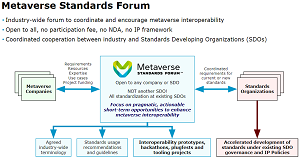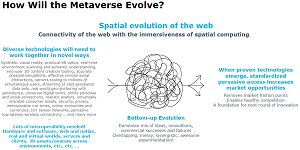News
Major Tech Firms Create Metaverse Standards Forum
The Metaverse Standards Forum, made up of some 37 tech organizations, has formed to foster cooperation in creating requirements and resources for the future of the metaverse industry.
Rather than setting those interoperability standards itself, the Metaverse Standards Forum will provide a venue for industry players to coordinate requirements and resources needed to build a foundation of open standards to ensure various individual metaverse implementations will work together. The work involves identifying critical requirements for metaverse standards to ensure real-world interoperability.
"Open to any organization at no cost, the forum will focus on pragmatic, action-based projects such as implementation prototyping, hackathons, plugfests, and open-source tooling to accelerate the testing and adoption of metaverse standards, while also developing consistent terminology and deployment guidelines," the organization said in a June 21 news release.
 [Click on image for larger view.] Metaverse Standards Forum (source: Metaverse Standards Forum).
[Click on image for larger view.] Metaverse Standards Forum (source: Metaverse Standards Forum).
A forum FAQ emphasizes its mission is not to define the amorphous term "metaverse," and it does not do so. The closest it comes is: "The metaverse is motivating the novel integration and deployment of diverse technologies for collaborative spatial computing, such as interactive 3D graphics, augmented and virtual reality, photorealistic content authoring, geospatial systems, end-user content tooling, digital twins, real-time collaboration, physical simulation, online economies, multi-user gaming, and more -- at new levels of scale and immersiveness."
For lack of an official definition of what metaverse means, Wikipedia defines the word as a futuristic term associated with the internet being a single, universal and immersive virtual world that is facilitated by the use of virtual reality (VR) and augmented reality (AR) headsets. In more modern colloquial use, however, it's described as a network of 3D virtual worlds focused on social connection. Various other sources indicate it definitely has something to do with the internet morphing from a collection of two-dimensional static web sites into 3D, immersive, real-time virtual worlds.
Meta (formerly Facebook) last year simply said: "The 'metaverse' is a set of virtual spaces where you can create and explore with other people who aren't in the same physical space as you." Yet another definition comes from Matthew Ball, author of The Metaverse Primer, who has said: "The Metaverse is an expansive network of persistent, real-time rendered 3D worlds and simulations that support continuity of identity, objects, history, payments, and entitlements, and can be experienced synchronously by an effectively unlimited number of users, each with an individual sense of presence."
 [Click on image for larger view.] How Will the Metaverse Evolve? (source: Metaverse Standards Forum).
[Click on image for larger view.] How Will the Metaverse Evolve? (source: Metaverse Standards Forum).
As far as those action-based projects the forum will focus on to get things rolling, they likely will feature 3D graphics, avatars, privacy, geospatial systems, networking, visual positioning service (VPS), extended reality (XR), user experience (UX), financial transactions, IoT and digital twins and so on.
For a concrete example, the forum said a typical hosted project might address 3D asset interoperability, specifically by exercising 3D asset workflow from authoring to runtime rendering in multiple engines by:
- Confirming asset behaviors and attributes satisfy use cases
- Testing the publishing and transmission pipeline
- Exercising interoperable behaviors and attributes in multiple runtime applications
"Multiple industry leaders have stated that the potential of the metaverse will be best realized if it is built on a foundation of open standards," the organization said. "Building an open and inclusive metaverse at pervasive scale will demand a constellation of open interoperability standards created by SDOs [Standards Developing Organizations] such as The Khronos Group, the World Wide Web Consortium, the Open Geospatial Consortium, the Open AR Cloud, the Spatial Web Foundation, and many others. The Metaverse Standards Forum aims to foster consensus-based cooperation between diverse SDOs and companies to define and align requirements and priorities for metaverse standards—accelerating their availability and reducing duplication of effort across the industry."
In addition to those organizations, founding members also include Meta, Microsoft, NVIDIA, Adobe, Alibaba, Qualcomm Technologies, Huawei, Sony Interactive Entertainment, Unity and many more. They will begin meeting next month.
About the Author
David Ramel is an editor and writer at Converge 360.